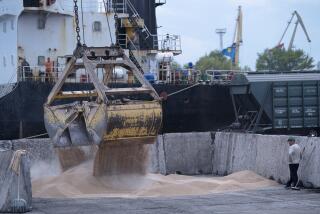Public Wants Food, Not Politics : Commonwealth: A weary Moscow shopper says that ‘nothing will change.’
- Share via
MOSCOW — At Food Store No. 4, the air was abuzz Monday, not with talk of the disintegrating, perhaps vanished Soviet Union, but with numbers.
“474!” one man muttered under his breath. “What a nightmare!”
“702,” a woman said to her friend, “We’ll have to come back toward the end of the day.”
With the mercury at 5 degrees above zero, bundled bodies stretched in a giant queue from the meat counter as a worker in a corner assigned numbers to newly arriving customers, handing them dog-eared scraps of paper indicating their prospects for purchasing cheap beef this day.
One would-be buyer, Zhenya Tereshkov, said he knew nothing about the treaty, signed the day before, forming a commonwealth among the republics of Russia, Ukraine, and Belarus. Tereshkov, 30, had fallen asleep before the 9 p.m. television news and had read no morning papers. When he heard about the treaty, he was indifferent.
“We hear something new every day,” said Tereshkov, who like many shoppers in Store No. 4 at midday, denied that the treaty means an end to the Soviet Union. “Nothing will change.”
In microcosm, the medium-sized, state-run food shop on Moscow’s Garden Ring Road was a vision of the economic horrors that have become customary in the Soviet Union. The beverage section was well-stocked. But because of icy temperatures, few patrons were in the mood for a cold drink. The vegetable counter, with the ubiquitous heads of cabbage and sacks of wet and mud-clad potatoes, was similarly devoid of people.
Upon rushing in from the icy street, most customers headed straight for the tail of the long meat line. At the head of the queue, beneath decades-old posters depicting quality cuts of lean meat garnished with fresh vegetables, two angry-looking women doled out the paper-wrapped prizes awarded for hours of wait and worry: fatty hunks of beef at 7 rubles a kilogram or roughly as little as 3 cents a pound.
While rising prices have been a major focus of worry for Muscovites in recent months, there was another source of confusion starting Monday. Meat was selling cheap, its price obviously fixed by the state. But now, by what state?
“The Union long since ceased to exist,” Eduard Baranov, a 51-year-old engineer said as he shuffled across the muddy floor toward the beef. Soviet President Mikhail S. Gorbachev, he added, “did some good things in his time, but he destroyed the Soviet Union.”
As for whether life would be better when Moscow becomes another city--rather than the capital--in the new commonwealth, Baranov scoffed. “The government has not yet issued a decree on price increases, but we are already feeling it,” he said, referring to soaring inflation and the Russian Federation leadership’s plan to end state controls on prices of most food and consumer goods this month.
Vyacheslav Tokarev, 42, said the business of forming a commonwealth of independent republics to replace the disintegrating Soviet Union will not alter the uncaring attitude of the government toward the common man, evidenced by the long lines and empty shelves. The leaders of Russia, Ukraine, and Belarus (formerly Byelorussia) “signed something,” he said. “But they didn’t ask us first. After the war, people believed. Now, they don’t believe in anything. We’re tired of believing.”
Sodya Yangolovna, 58, shoved a bundle of the coveted beef in her bag and sounded confused and betrayed. “We don’t understand anything, we don’t believe in anyone,” she said. “We are in a dark forest.”
But some shoppers said they still have faith--in their native land, in Gorbachev. “We will still need a leader,” said Lyudmila Petrovna, 63, a retiree who lives on a small pension. “All the republics have been linked for so long, we can’t live without each other. The Union will survive.”
The most damning reaction came from a man who called himself Nikolai. Half a century ago this month, he was engaged in one of the most colossal struggles of World War II--the battle for the Soviet capital. “When the Germans were on Moscow’s doorstep, things were better than they are now,” he said.
Gutterman is a researcher in The Times’ Moscow bureau.
More to Read
Sign up for Essential California
The most important California stories and recommendations in your inbox every morning.
You may occasionally receive promotional content from the Los Angeles Times.













